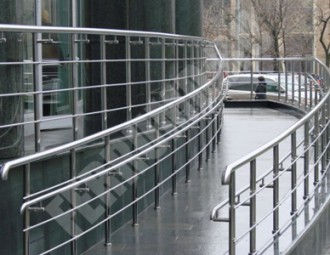Project “Accessible city” is launched in Belarus

Among the tasks of the project – creation of online-portal on barrier-free environment and online-map of Belarus’ objects accessible for physically impaired persons.
The map will mark shops, drugstores, churches, banks, universities, cafes, museums, and other organizations in the sphere of services in Belarusan towns and cities, informed Yauheni Shauko, the chair of the “Republican Association of wheelchair-bound disabled”.
Besides, the project provides for the creation of accessibility map for car navigators and training of experts on barrier-free environment among wheelchair-bound disabled.
To explain the scales of the problem Yauheni Shauko uses the following comparison: “Now there are almost 19 thousand people who are using wheelchairs in Belarus, which equals the population of Zaslaūje. But only one out of ten of them can easily go outside and easily come back. Only one out of ten social service objects can be easily attended in wheelchairs. A lot of physically impaired persons are also living in Belarus – more than 2.5 million people. These people include senior citizens, small children, mothers with baby carriages, and the disabled. Thus, the project matters not only for the people in wheelchairs”.

A webpage www.freeway.by exists since 2010. It was created according to the results of work of volunteers in Mozyr: almost 600 objects of social infrastructure were studied and put on a map with notes about the level of their accessibility. At present “Republican Association of wheelchair-bound disabled” will try to cover Minsk and other Belarusan cities.
A renovated www.freeway.by will contain information required for the formation of barrier-free environment at specific objects; for instance, building standards.
It is planned that the availability map will be filled by corporative volunteerism. Today two companies are taking part in the project – online-hypermarket 21vek.by and online-store oz.by.
Besides, the creators of the project plan to issue a renewed manual on formation of barrier-free environment, as well as organize work for improving the image of organizations that place emphasis on creation of barrier-free environment. It will be possible to send an online-complaint for cases of flawed barrier-free environment. For example, to the State Motor Vehicle Inspectorate if there is a problem with parking stalls for wheelchair-disabled.
As to the corporative volunteerism, in Belarus it is at a start level, informed Tatsiana Kazlouskaja, a representative of B2S, an agency of social projects: “Corporative volunteerism is now very popular in the EU and in the US. In Belarus it is only starting to appear; we have examples of corporative volunteerism, but these instances are single”.
However, the moods are encouraging: “According to the results of the sociological research conducted in 2012, every second Belarusan would like to be a volunteer”.
The state announces its readiness to help the project. At least it was stated by Iryna Dudka, the deputy chairman of labor and social security committee of the Minsk city executive committee. According to her, now, for example, accommodation for wheelchair-disabled is being exchanged in Minsk (15 people are waiting to change their accommodation), and elements of barrier-free environment in Minsk are created in 120 places of residence of people with disabilities annually.
Iryna Dudka also informed about the work over a new program to create comfortable conditions for life of people with disabilities: “The program was planned for 2011-2015 years. Now we are elaborating a concept for 2016-2020 years. When we started, the weight of social infrastructure projects equipped with the elements of barrier-free environment was less than 61%. For now it totals 69%”.
However, as Yauheni Shauko mentioned, new program already has some criticism: “The developers retreat from the notion “elements of barrier-free environment” because it is impossible to assess what these “elements” are”.
Let us note that Iryna Dudka finds it useful to repeat the experiment of the Bundestag deputies, who changed to wheelchairs for one day when Germany still had problems with the barrier-free environment. After such experience problems started being solved much more effectively and much faster. Perhaps, one day in a wheelchair will help the officials of Minsk city executive committee to understand what and how should be changed in the approaches of the state towards the formation of barrier-free environment.
-
03.01
-
07.10
-
22.09
-
17.08
-
12.08
-
30.09



























